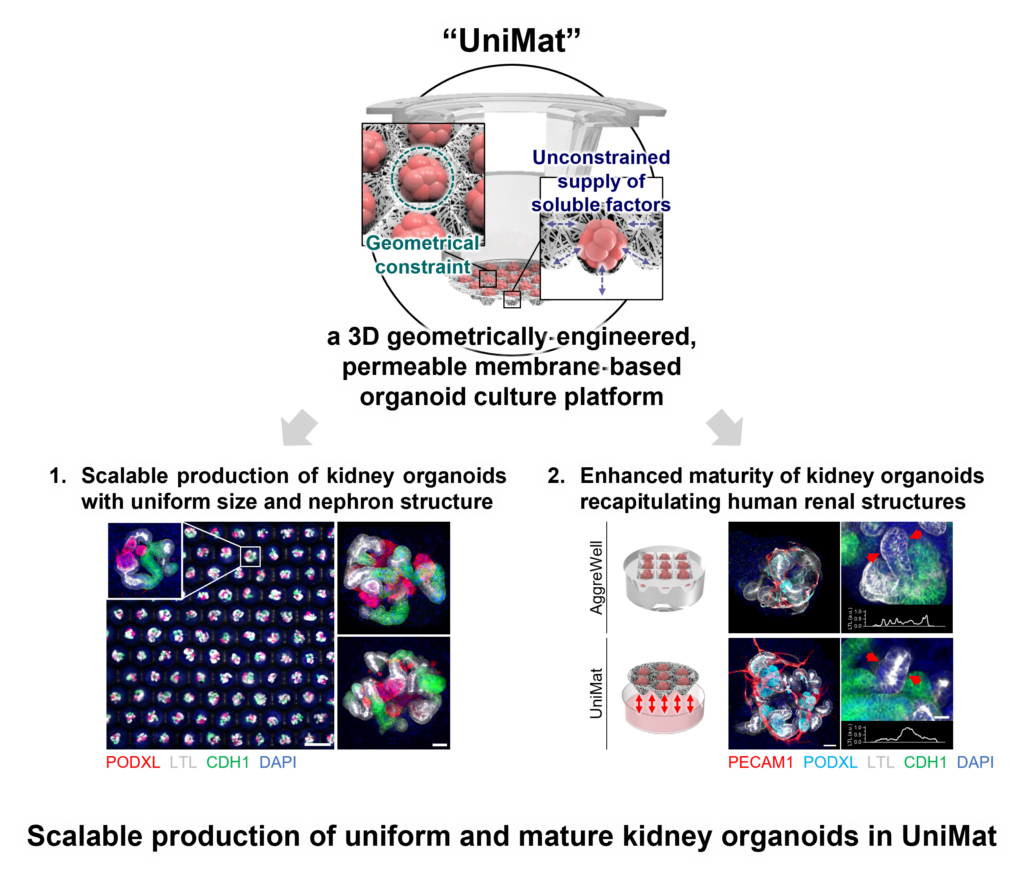Abstract
The development of animal replacement tests and regenerative treatments has received a significant endorsement.
A research team, led by Professor Tae-Eun Park from the Department of Biomedical Engineering at UNIST, in collaboration with Professor Dong Sung Kim at POSTECH has successfully created a platform that enables the scalable and uniform production of organoids mimicking biological functions.
Organoids are three-dimensional (3D) cellular constructs that replicate the functions of human organs. They have attracted considerable attention in the fields of human organ development, disease modeling, and regenerative medicine research. However, the heterogeneity and low reproducibility of organoids present significant challenges for their scalable production, thereby limiting their practical applications in clinical trials and drug development processes. Additionally, existing technologies fall short in producing organoids at scale to meet industrial demands.
To address these challenges, the research team has developed a platform called UniMat (Uniform and Mature Organoid Culture Platform), which facilitates the scalable production of mature organoids. This platform employs a three-dimensional engineered membrane composed of ultra-fine nanofibers-approximately 1/200 the diameter of a human hair-thereby creating a structural environment that promotes uniform organoid formation. Furthermore, it enhances the delivery of nutrients and differentiation factors through material permeability, which is crucial for organoid differentiation and maturation. Utilizing UniMat, the team successfully produced kidney organoids featuring nephron structures and vascularization akin to those found in human kidneys, derived from human-induced pluripotent stem cells. This method achieved consistent quality and markedly improved production efficiency. Additionally, the team used UniMat to establish a model of polycystic kidney disease, underscoring its potential for standardized organoid-based disease modeling and drug evaluation.

Figure 1. (a)Schematic of the UniMat platform. (b) UniMat fabrication process. (c)Photograph of the fabricated UniMat platform.
The research team remarked, "Through these research outcomes, we not only accelerate organoid-based R&D that requires high reproducibility and reliability, but we also anticipate making significant contributions to the development of alternative testing methods that do not rely on animals, which are gaining increasing attention." They further noted, "By addressing both the challenges of quality assurance and scalable production of organoids with UniMat, we have laid the foundation for the practical application of organoids in clinical and pharmaceutical industries."
The findings of this research have been published in the online edition of Nature Communications on October 31, 2024. The research received support from the Bio & Medical Technology Development Program, the Mid-Career Researcher Program, and the Young Researcher Program funded by the National Research Foundation of Korea and the Ministry of Science and ICT (MSIT), as well as the Alchemist Project funded by the Ministry of Trade, Industry, and Energy (MOTIE).
Journal Reference
Dohui Kim, Hyeonji Lim, Jaeseung Youn, "Scalable production of uniform and mature organoids in a 3D geometrically-engineered permeable membrane," Nat. Commun., (2024).






